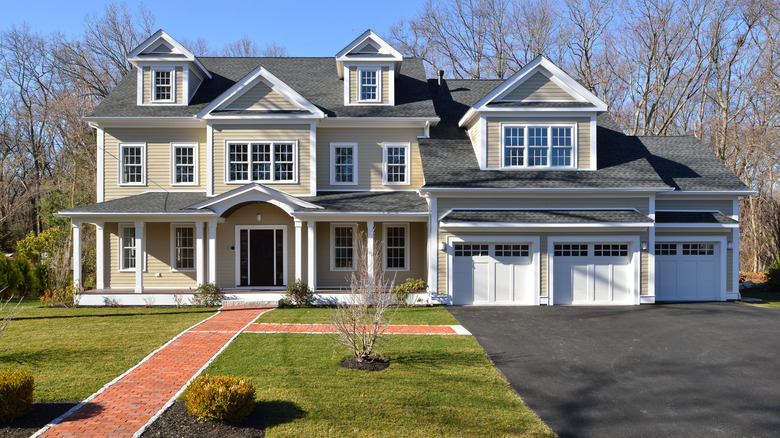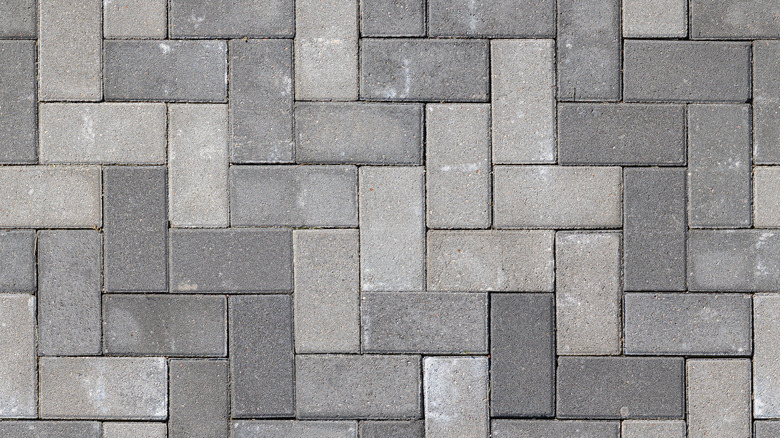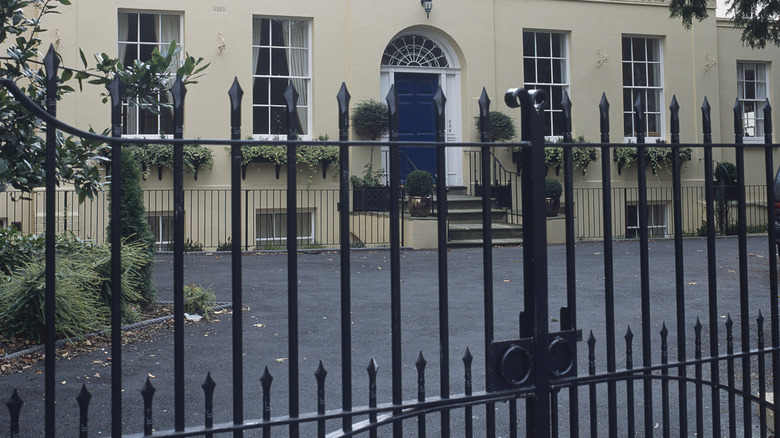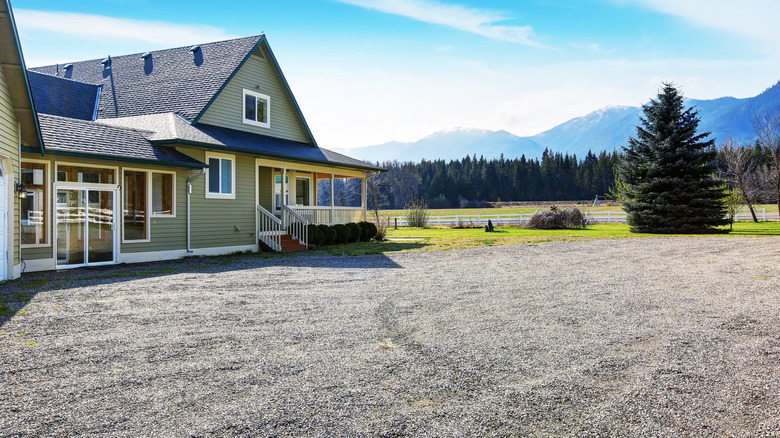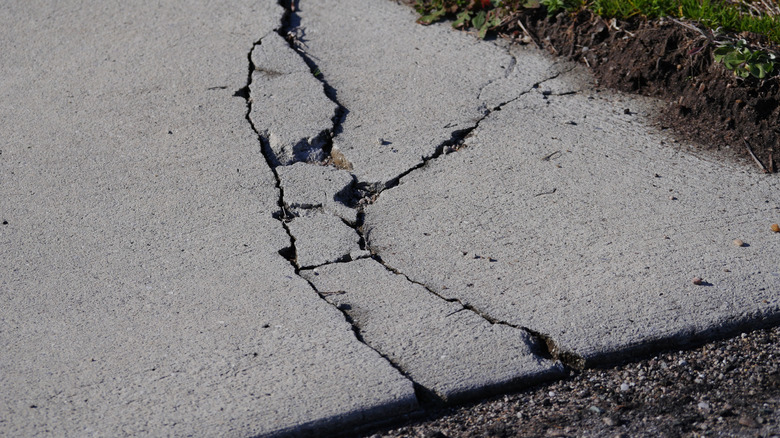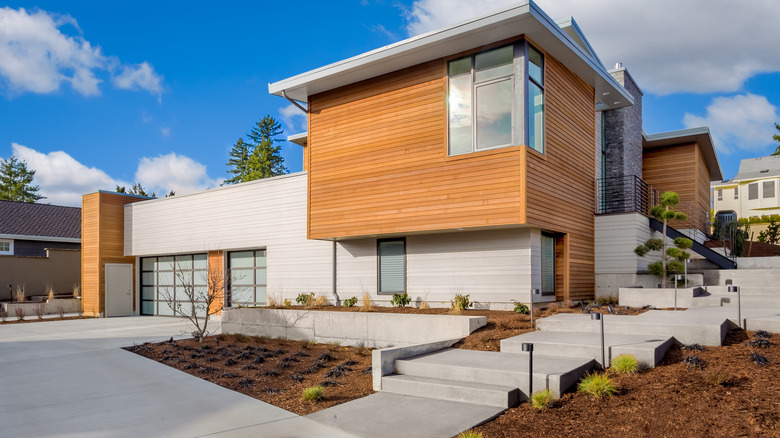How Much Does It Cost To Pave A Driveway?
While not often thought about, driveways serve an important purpose for your house: you park your car there each day, your kids may place their lemonade stand on it, and it serves as an entryway to your home. So you should treat it well, patching it when you see any holes, replacing any broken segments, and cleaning it regularly. But the time may come when repairs aren't enough. How long should a driveway last? It depends on several factors, including the climate you live in and the materials used to create it. Asphalt driveways can withstand many seasons of snow and sun and will need replacing after maybe 15 to 25 years. Concrete ones stay fresh a bit longer, say 25 to 35 years, according to AAA Concrete Raising Co.
When the time comes, a new driveway can cost between $1 and $30 for each square foot, with the average price of $10, reported Forbes Advisor. Why such a wide range? Well, driveways come in many styles and sizes that use a variety of materials and installation methods. Homeowners who desire specialized designs or complicated excavation — such as removing a tree stump or bushes — can expect to spend somewhere between $2000 and $7000. Compare that to the basic 600-square-foot concrete slab you find in most homes that fits two cars, which might hit $8 per square foot, with a minimum total of $4,800. Here are some of the factors to consider when installing a new driveway.
Factors for cost
Lots of things impact the cost of driveways, which is why the range is so disparate. With the average parking spot running from $3 to $15 per square foot, according to Forbes Advisor, you'll need to consider several elements.
Materials
Most driveways are made of either asphalt, concrete, blacktop, gravel, pavers, or rubber. This variety of materials accounts for the wide range in costs — depending on what you use, material expenses might set you back anywhere from $1500 to $11,000.
Installation
Size does matter, at least when it comes to driveways. Cost is calculated by the square footage, and while bigger may be better in theory, it comes with additional expense. Any excavation also adds to the price, as does any extra work: from embedding special designs in the material to site preparation.
Condition
Sometimes you may only need a small amount of maintenance, like repairing a hole or extending the driveway. This will cost $2 to $15 per square foot, depending on what material you use. Removing the existing driveway will incur additional labor costs, around $1 to $2 per square foot. Resurfacing the area is the cheapest option at $1 to $10 per square foot, but that method is only an option for driveways without excessive damage.
Location
The place you live in can also contribute to costs, according to Askeaton Paving Surfacing. Rain, wind, and even UV rays can degrade the surface of a driveway, which is why areas with extreme weather may require more durable materials.
Additional costs
Besides the basic costs for materials and labor, several other factors can affect the overall price of your driveway.
Heated driveways
A heated driveway can help reduce your winter problems by melting snow and ice quickly with little scraping or shoveling required. But that convenience comes at a price. HomeServe estimated anywhere from $1,600 to $15,000 or more. The price depends on whether you use a built-in heating system at around $4000 to $7,500 or portable mats, which cost between $1,600 and $3,000. In addition, heating installation ranges from $12 to $21 per square foot.
Complex designs
If you want to add a little flair to your driveway, stamped concrete allows you to insert patterns, embossing, or textures for about $4000 to $12,000, depending on the complexity of your vision, reported Easter Concrete Contracting. A basic design for a 600-square-foot segment, for instance, might set you back $4000 to $6000.
Driveway gates
You can limit who accesses your property with an entrance gate, which averages about $4,000 for installation alone, said Fixr. Prices vary depending on the type of gate, either manual or automatic, the material such as wood or aluminum, and the size. If you're looking for security, an aluminum swinging gate that includes an intercom and a keypad can cost up to $12,000 for a 16-foot by 8-foot space.
Seal it up
Both asphalt and concert driveways will benefit from sealing, which will improve the look and prevent it from deteriorating, according to Family Handyman. It is inexpensive, too, at about 10 to 30 cents per square foot. Asphalt usually requires a sealant every three years, while concrete needs it around the four or five-year mark.
Types of driveways
the best choice of material for your driveway depends on several factors, including your available budget, how often you want it to last, and what design aesthetic you prefer. Here are some of the most popular types of driveway materials according to The Money Pit.
Asphalt/Blacktop
Many homeowners opt for this type of driveway because it checks all the right boxes: it looks clean, it is durable, and the price is reasonable at about $830 for a 600-foot square space. If the area is hilly or sloped and more difficult to cover, this cost can rise.
Concrete
Homeowners like concrete since it offers durability, it is affordable (about $3,000 for a two-car driveway) and it offers easy maintenance. You can even dress it up with stamped patterns, borders or custom finishes that will up the décor factor. But, of course, that also adds to the price tag, at about $10 to $15 per square foot.
Gravel
Since installation is simple and quick, gravel provides one of the cheapest options at around $800 once the driveway is prepped. However, you will also need to rake it fairly regularly and add new stones periodically.
Pavers
While brick-paved driveways look beautiful, they are much more expensive than some of the other materials at about $20 per square foot. Brick pavers, which are made of fired clay, will wear over the years, especially if the area experiences extreme hot or cold temperatures. You can keep them looking pristine by power washing them annually, and weeding any bits of moss or greenery from between the cracks.
Why do you need a new driveway?
Driveways won't last forever. Depending on the material used, you will need to upgrade it eventually. If the pavement merely has a few cracks, you may not need to completely replace it — just fix the damage, said Sundek, and pay attention to why the problem occurred. For instance, are roots encroaching the area? You might need to pull that tree out. You'll want to replace your driveway if it has extreme problems, such as potholes, severe cracks, or drainage issues. Moreover, some designs go out of style, and you may want a makeover to match your new aluminum siding or other home renovations.
If it's not necessary to replace an entire driveway, you can replace the inferior section only or resurface it. To decide if it's time to refurbish your home's driveway, you should ask a few questions, such as: How many years ago was the driveway installed? How often, and in what way do you use it (for instance, do you park your heavy RV there)? Think, too, about how well you maintain the driveway. Driveways have long lives — asphalt keeps kicking for about 20 years and concrete stands up to the elements for 30, according to The Leaflet. Pavers, on the other hand, can last for 25 to 50 years, sometimes more, depending on maintenance, said JS Brick Corporation, and you can replace damaged bricks as necessary.
Benefits of a new driveway
Obviously, a driveway without potholes, cracks, drainage problems, etc., is what every homeowner wants. You don't want to damage your car or have anyone hurt on your property because they fell into a pothole on your asphalt. A new driveway also adds to your property's value, said Blacktop Concepts, and they are relatively easy to install as opposed to a more extensive renovation such as remodeling your kitchen.
The driveway is the first thing a potential home buyer sees when viewing your home, and when that area looks good it gives your property curb appeal. This means that at first glance, your home seems attractive and impressive. That could add up to $5,000 to $7,000 to your house's value if the driveway looks new. Replacing your driveway can save you money as well, said Premier Surfacing. If you are constantly filling in cracks and holes, the process becomes time-consuming and costly. Plus, when your driveway looks like a patchwork quilt, it simply doesn't look nice. You want a home that is comfortable and well-kept — and sometimes that means you need a new driveway.
